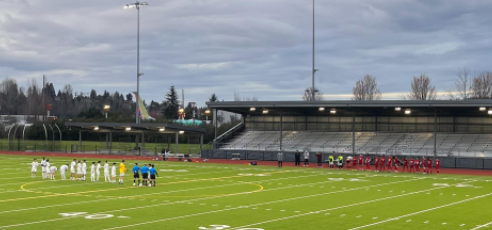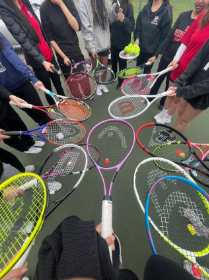Moving to a new country is a life-changing experience, filled with challenges and opportunities. Today, I’m sitting down with 3 of my friends, Nhu San, Y Nguyen, and Cat Tien, who moved from Vietnam to the U.S. just a year ago, to hear about their journey of adapting to a new culture, school, and way of life. We’ll discuss the biggest challenges they faced, how they adjusted to a new environment, and whether they see their future here or back home. Immigrant stories are important because they highlight the resilience and determination it takes to start over, and through this conversation we hope to provide insight into what it truly means to build a new life in a different country.
1. What was the most exciting and the most challenging part of moving to the U.S.?
Nhu San: “One of the most interesting parts about coming to America is that the weather is quite nice, and the most difficult part about coming to America is that I don’t know anything about it and I have to get used to everything from English, living place, school, society, and daily environment.”
Y Nguyen: “The most exciting thing I have when moving to the U.S. is a new environment, but when I have been moving here, language is the most challenging for me.”
Cat Tien: “The most exciting part of moving to the US was the new opportunities,
meeting different people, and discovering new cultures for me. The difficult part was adapting to the new education system and the culture shock of this country.”
2. How has moving to the U.S. changed your perspective on your home country?
Nhu San: “It changed a lot with my thinking when I was in my country. I always thought America would be like in the American movies I’ve seen; the movies I’ve seen America in are very vibrant and bustling. I always thought that things in America were very expensive and hard to buy and the people who could buy them had to be super rich, but when I came to America, I found everything was different from what I imagined, it wasn’t that expensive.”
Y Nguyen: “In my opinion, the US has a chance to help people study higher after high school.”
Cat Tien: “My perspective on my homeland has not changed. After experiencing living and studying in the United States, I realized that each is developing in its way.”
3. How did you adjust to the language barrier (if any)?
Nhu San: “I think I improved it by watching movies, so it was okay.”
Y Nguyen: “I am still confused when I use English so I try to learn more vocabulary, so when I can’t talk a whole sentence or people can’t understand what I say, I will try to say the exact pronunciation easiest so that people can understand what I’m trying to say.”
Cat Tien: “English is not my first language, so on the first day aboard, English was an obstacle for me.”
4. How did you feel on your first day of school in the U.S., and how does that compare to now?
Nhu San: “The first day I came to America, I felt like everything was new, like I had just moved, and those new things were always strange to me, and now I feel like I have adapted to life now, although not much.”
Y Nguyen: “The first time, I felt ashamed and a little bit embarrassed, but now I think it is more comfortable than before, but just sometimes I have been feeling shameful because I can’t follow my assignment and lesson in class.”
Cat Tien: “On my first day of school, I was quite nervous because of my language barrier and overwhelmed by the number of people from so many different countries.”
5. Looking back, what’s something you’re proud of overcoming during your transition to life in the U.S.?
Nhu San: “I have passed the immigration to America. I have overcome the challenge of adapting to my current life and starting a new life here.”
Y Nguyen: “I think I am proud of myself for how I have the courage to try to make people understand my English pronunciation, and I learned a new lesson in English.”
Cat Tien: “After studying and living in the United States, I gradually adapted to a new culture, made friends, and got good grades despite having difficulty communicating.”
6. What were some of the biggest challenges you faced when you first moved?
Nhu San: “Communicating with people I don’t know is one of my biggest challenges because I feel a little shy and embarrassed to talk to people that I don’t know.”
Y Nguyen: “First of all, literally is language, after that is the livelihood of my family.”
Cat Tien: “Some of the biggest challenges that I faced were the first move to the U.S was homesickness. I miss the food and friends in my hometown. I look forward to welcoming the new year with my family and soaking in the joyful atmosphere there.”
7. Do you see yourself staying in the U.S. long-term, or do you plan to return to your home country?
Nhu San: “I think I will stay here for a long time because this is an environment for me to study seriously.”
Y Nguyen: “My option is to stay in the U.S. long-term because I have my family living here, but if I can, I want to come back to my country because of my memories there.”
Cat Tien: “I’m not sure about that yet. However, I think I need to study and earn money in the U.S. first. Then I will go back to my home country more often, just like traveling, not going back there to live.”
8. If you could advise someone moving to the U.S. as a student, what would it be?
Nhu San: “Come to America, and you will experience things you can’t imagine. And You should come to America soon to be able to learn new things in America. The sooner, the better.”
Y Nguyen: “I would advise someone in the U.S. to have an opportunity for jobs and higher education for their life.”
Cat Tien: “As a student in the United States, I want to say that you should find out what you like and what you want to do and set a goal for it. And if you fail, it’s okay, it shows that you are trying every day to be able to succeed on the path you choose for yourself.”
In the end, all the difficulties have passed. They have mostly overcome that difficulty to be better in their current place of living. Most people will have problems with language and communication, and I, at first, had the same problem. Gradually, it got better through English classes at school. I often read books to learn new vocabulary. The way of teaching in the US is also completely different from Vietnam because in Vietnam, I feel like I have to study a lot. Here everything is taught very slowly, like the math I learned from grade 6 in Vietnam, I learned it in grades 8 & 9 here. Overall, coming to the US is a good experience.
People interviewed: Nhu San, Cat Tien, and Y Nguyen.








